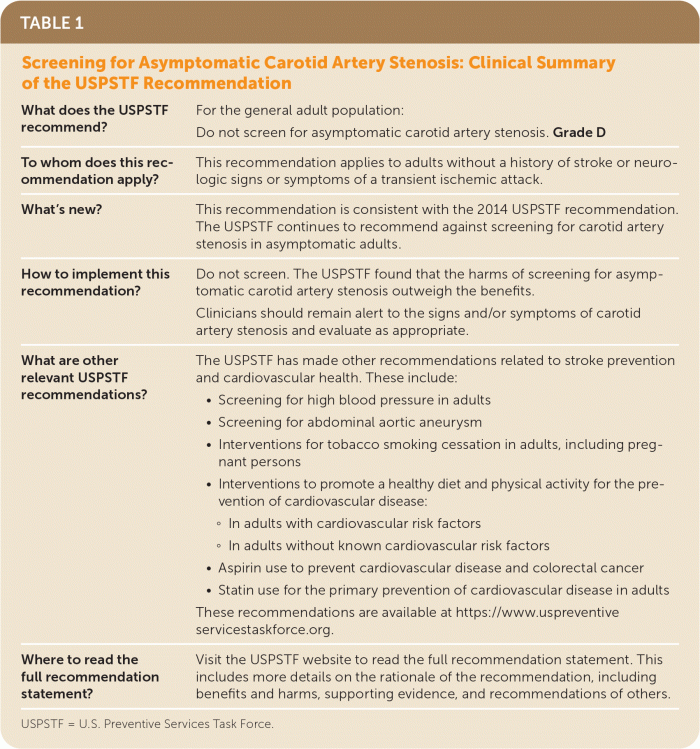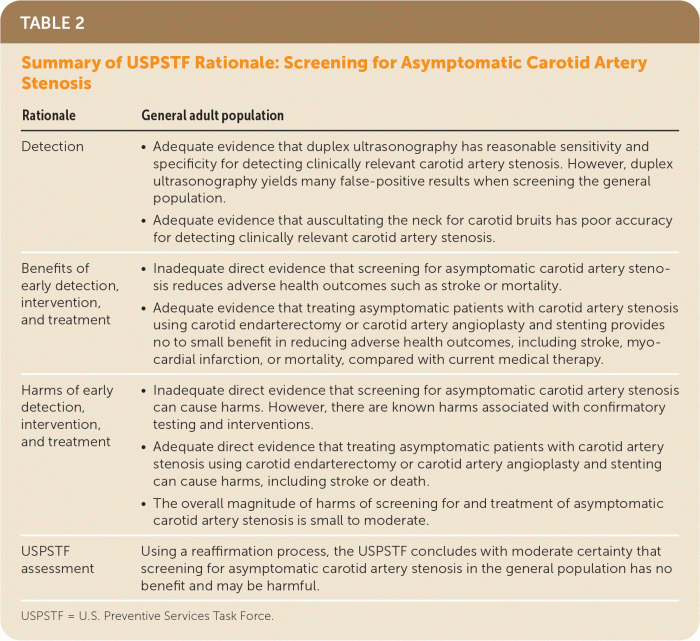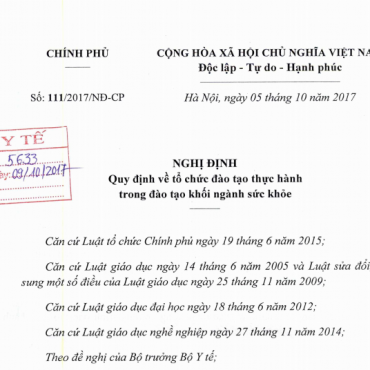Contact Admission
International Collaboration
Screening for Asymptomatic Carotid Artery Stenosis: Recommendation Statement
Screening for Asymptomatic Carotid Artery Stenosis: Recommendation Statement
Am Fam Physician. 2021 May 15;103(10):614-617.
Summary of Recommendation and Evidence
The USPSTF recommends against screening for asymptomatic carotid artery stenosis in the general adult population (Table 1). D recommendation.

See the Practice Considerations section for a description of adults at increased risk.
Importance
Carotid artery stenosis is atherosclerotic disease that affects extracranial carotid arteries. Asymptomatic carotid artery stenosis refers to stenosis in persons without a history of ischemic stroke, transient ischemic attack, or other neurologic symptoms referable to the carotid arteries. The prevalence of asymptomatic carotid artery stenosis is low in the general population but increases with age.1 Although asymptomatic carotid artery stenosis is a risk factor for stroke and a marker for increased risk for myocardial infarction, it causes a relatively small proportion of strokes.2 Stroke is a leading cause of death and disability in the United States.3
USPSTF Assessment of Magnitude of Net Benefit
REAFFIRMATION
In 2014, the USPSTF reviewed the evidence for screening for carotid artery stenosis and issued a D recommendation.4 The USPSTF has decided to use a reaffirmation deliberation process to update this recommendation.5 The USPSTF uses the reaffirmation process for well-established, evidence-based standards of practice in current primary care practice for which only a very high level of evidence would justify a change in the grade of the recommendation.5 In its deliberation of the evidence, the USPSTF considers whether the new evidence is of sufficient strength and quality to change its previous conclusions about the evidence.
Using a reaffirmation process, the USPSTF concludes with moderate certainty that the harms of screening for asymptomatic carotid artery stenosis outweigh the benefits.
See Table 2 for more information on the USPSTF recommendation rationale and assessment. For more details on the methods the USPSTF uses to determine the net benefit, see the USPSTF Procedure Manual.5

Practice Considerations
PATIENT POPULATION UNDER CONSIDERATION
This recommendation applies to adults without a history of transient ischemic attack, stroke, or other neurologic signs or symptoms referable to the carotid arteries.
ASSESSMENT OF RISK
Although screening for asymptomatic carotid artery stenosis is not recommended for the general adult population, several factors increase risk for carotid artery stenosis, including older age, male sex, hypertension, smoking, hypercholesterolemia, diabetes, and heart disease.6 However, there are no externally validated, reliable methods to determine who is at increased risk for carotid artery stenosis or who is at increased risk of stroke when carotid artery stenosis is present.7–9
SCREENING TESTS
Several modalities are proposed for screening for carotid artery stenosis, including carotid duplex ultrasonography, magnetic resonance angiography, and computed tomography angiography. Auscultation for carotid bruits has been found to have poor accuracy for detecting carotid stenosis or stroke and is not considered a reasonable screening approach.7 The USPSTF does not recommend screening adults without a history of transient ischemic attack, stroke, or other neurologic signs or symptoms referable to the carotid arteries.
TREATMENT
Medical and surgical options are available for treatment of carotid artery stenosis. In general, treatment of asymptomatic carotid artery stenosis is directed at systemic atherosclerotic disease and often includes statins, antiplatelet medications, management of hypertension and diabetes, and lifestyle modification interventions. Surgical procedures designed to improve carotid artery blood flow include carotid endarterectomy, carotid artery angioplasty and stenting, or transartery revascularization. Medical therapy can be used alone or with revascularization procedures.7 For patients with asymptomatic disease, the harms of surgical interventions compared with appropriate medical therapy appear to outweigh the benefits.
OTHER RELATED USPSTF RECOMMENDATIONS
The USPSTF has issued other recommendation statements related to stroke prevention and cardiovascular health. These include:
-
Screening for high blood pressure in adults10
-
Screening for abdominal aortic aneurysm11
-
Interventions for tobacco smoking cessation in adults, including pregnant persons12
-
Interventions to promote a healthy diet and physical activity for the prevention of cardiovascular disease:
-
Aspirin use to prevent cardiovascular disease and colorectal cancer15
-
Statin use for the primary prevention of cardiovascular disease in adults16
This recommendation statement was first published in JAMA. 2021;325(5):476–481.
The “Updates of Previous Recommendations," "Supporting Evidence,” “Research Needs and Gaps,” and “Recommendations of Others” sections of this recommendation statement are available at https://www.uspreventiveservicestaskforce.org/uspstf/recommendation/carotid-artery-stenosis-screening.
The USPSTF recommendations are independent of the U.S. government. They do not represent the views of the Agency for Healthcare Research and Quality, the U.S. Department of Health and Human Services, or the U.S. Public Health Service.
REFERENCES
1. de Weerd M, Greving JP, Hedblad B, et al. Prevalence of asymptomatic carotid artery stenosis in the general population: an individual participant data meta-analysis. Stroke. 2010;41(6):1294–1297....
2. Abbott AL, Brunser AM, Giannoukas A, et al. Misconceptions regarding the adequacy of best medical intervention alone for asymptomatic carotid stenosis. J Vasc Surg. 2020;71(1):257–269.
3. Centers for Disease Control and Prevention. National Center for Health Statistics: leading causes of death. October 30, 2020. Accessed December 9, 2020. https://www.cdc.gov/nchs/fastats/leading-causes-of-death.htm
4. U.S. Preventive Services Task Force. Screening for asymptomatic carotid artery stenosis: U.S. Preventive Services Task Force recommendation statement [published correction appears in Ann Intern Med. 2015;162(4):323]. Ann Intern Med. 2014;161(5):356–362.
5. U.S. Preventive Services Task Force. Procedure manual. December 2015. Accessed December 9, 2020. https://www.uspreventiveservicestaskforce.org/uspstf/procedure-manual
6. Meschia JF, Bushnell C, Boden-Albala B, et al.; American Heart Association Stroke Council; Council on Cardiovascular and Stroke Nursing; Council on Clinical Cardiology; Council on Functional Genomics and Translational Biology; Council on Hypertension. Guidelines for the primary prevention of stroke: a statement for healthcare professionals from the American Heart Association/American Stroke Association. Stroke. 2014;45(12):3754–3832.
7. Guirguis-Blake JM, Webber EM, Coppola EL. Screening for asymptomatic carotid artery stenosis in the general population: updated evidence report and systematic review for the U.S. Preventive Services Task Force. Evidence synthesis no. 199. AHRQ publication no. 20-05268-EF-1. Agency for Healthcare Research and Quality; 2021.
8. Jonas DE, Feltner C, Amick HR, et al. Screening for asymptomatic carotid artery stenosis: a systematic review and meta-analysis for the U.S. Preventive Services Task Force. Evidence synthesis no. 111. AHRQ publication no. 13-05178-EF-1. Agency for Healthcare Research and Quality; 2014.
9. Guirguis-Blake JM, Webber EM, Coppola EL. Screening for asymptomatic carotid artery stenosis in the general population: updated evidence report and systematic review for the US Preventive Services Task Force. JAMA. 2021;325(5):487–489.
10. U.S. Preventive Services Task Force. Screening for high blood pressure in adults: U.S. Preventive Services Task Force recommendation statement. Ann Intern Med. 2015;163(10):778–786.
11. US Preventive Services Task Force. Screening for abdominal aortic aneurysm: US Preventive Services Task Force recommendation statement. JAMA. 2019;322(22):2211–2218.
12. US Preventive Services Task Force. Interventions for tobacco smoking cessation in adults, including pregnant persons: US Preventive Services Task Force recommendation statement. JAMA. 2021;325(3):265–279.
13. US Preventive Services Task Force. Behavioral counseling interventions to promote a healthy diet and physical activity for cardiovascular disease prevention in adults with cardiovascular risk factors: US Preventive Services Task Force recommendation statement. JAMA. 2020;324(20):2069–2075.
14. US Preventive Services Task Force. Behavioral counseling to promote a healthful diet and physical activity for cardiovascular disease prevention in adults without cardiovascular risk factors: US Preventive Services Task Force recommendation statement. JAMA. 2017;318(2):167–174.
15. U.S. Preventive Services Task Force. Aspirin use for the primary prevention of cardiovascular disease and colorectal cancer: U.S. Preventive Services Task Force recommendation statement. Ann Intern Med. 2016;164(12):836–845.
16. US Preventive Services Task Force. Statin use for the primary prevention of cardiovascular disease in adults: US Preventive Services Task Force recommendation statement [published corrections appear in JAMA. 2020;323(7):669, and JAMA. 2020;323(7):669–670]. JAMA. 2016;316(19):1997–2007.
This summary is one in a series excerpted from the Recommendation Statements released by the USPSTF. These statements address preventive health services for use in primary care clinical settings, including screening tests, counseling, and preventive medications.
The complete version of this statement, including supporting scientific evidence, evidence tables, grading system, members of the USPSTF at the time this recommendation was finalized, and references, is available on the USPSTF website at https://www.uspreventiveservicestaskforce.org/.
This series is coordinated by Kenny Lin, MD, MPH, deputy editor.
A collection of USPSTF recommendation statements published in AFP is available at https://www.aafp.org/afp/uspstf.
Fulltext pdf: /vnt_upload/library/05_2021/aafp.pdf
Other library
- Effect of Endovascular Treatment Alone vs Intravenous Alteplase Plus Endovascular Treatment on Functional Independence in Patients With Acute Ischemic Stroke ( 15:26 - 20/05/2021 )
- Autoimmune Testing in Primary Care for Rheumatology Referrals ( 15:42 - 19/05/2021 )
- Chronic Kidney Disease: Laboratory Support of Diagnosis and Management ( 15:38 - 19/05/2021 )
- Hypothyroidism: Diagnosis and Treatment ( 15:32 - 18/05/2021 )
- Molecular Diagnostic Yield of Exome Sequencing in Patients With Cerebral Palsy ( 13:49 - 18/05/2021 )
- Association Between Dispatch of Mobile Stroke Units and Functional Outcomes Among Patients With Acute Ischemic Stroke in Berlin ( 13:41 - 18/05/2021 )
- Screening for Hypertension in Adults US Preventive Services Task Force Reaffirmation Recommendation Statement ( 14:46 - 15/05/2021 )
















